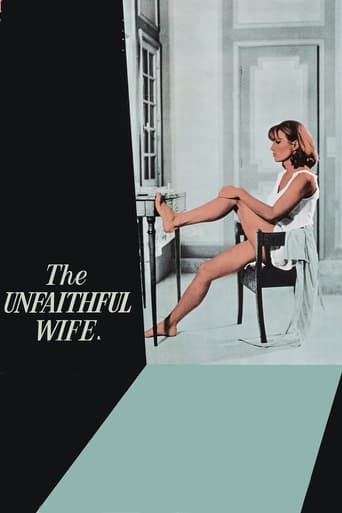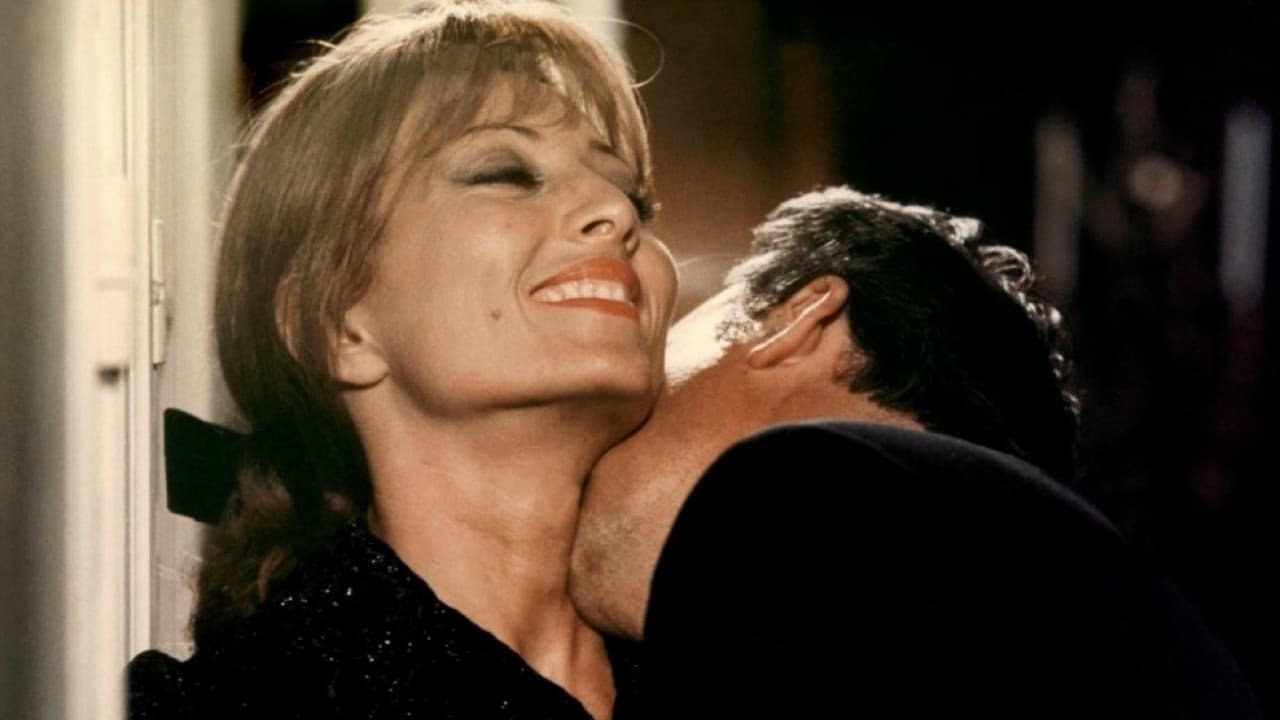Eumenides_0
In my desire to discover the work of Claude Chabrol, I watched The Unfaithful Wife. And I regret saying it was a disappointment.Chabrol constructs a capable, but unmemorable suspense movie. He knows the language and structure of the genre, but the movie lacks that extra element that makes it special.A loving husband suspects his wife is betraying him with another man. He hires a private detective to prove him right. Then he decides to confront the lover. There's no point describing the rest of the story, but then again there's nothing worth describing afterwards. It's a straightforward, banal plot without any innovation, interesting dialogue or great acting to rise it above mediocrity.There is perhaps fifteen minutes worth of tension, suspense or originality in the movie. They occur when the husband meets the lover. He does it in a charming, friendly way. He insinuates himself into the lover's apartment with full honesty but pretending not to care about the affair. He earns the lover's trust. All the time the viewer is thinking what is going to happen next. It's genuinely thrilling, but that's it.There's an attempt at ambiguity at the end of the movie, but rather than being something that challenges our ideas or values, it's just one of those dull ambiguous endings that desperate directors of thrillers end their unspectacular movies with, where we're left wondering whether the killer is or is not going to be caught. Seeing as how that's not really the point of the movie, and seeing how the viewer is never seduced into caring about the characters all, it's quite pointless.Claude Chabrol is so praise - he's called the French Hitchcock; but people can be too generous in their compliments sometimes - that I'm hoping my next attempt at his movies will be better. But this was a poor introduction.
joel-280
Alice Liddel's (what a wonderful name!!) comment is arguable but, I think, off the mark. Many different things are going on in this movie, and one of the reasons Chabrol is admired is his skill in creating and using ambiguity, which lures the viewer in, requires him to make his own interpretation, and thus involves him in the movie much more deeply than would happen with a clear, obvious story line.To me what happens between the husband and wife is, they both have become disinterested with each other, sexually and emotionally; the wife takes a lover and, as she and we find out the purpose of this later, tests/taunts her husband: to reignite her love for him, he must prove that he loves her by doing something outrageous, difficult, dangerous, etc. She might or might not have had this in mind at a conscious level; it appears that she did not, which makes it even more interesting. He does it -- again, probably unintentionally -- and thus recreates his love and passion for her, and hers for him. By accident, they have successfully re-courted and re-conquered each other.This is what it's about, and would be regardless of the ending -- which Chabrol has (again)left ambiguous. Unfortunately, the crucial deed that saved the marriage turned out to be a murder, so there has to be at least a strong hint that they won't get away scot free.An irritatingly slow movie for quite a while, but ultimately very well done and rewarding for the viewer.
Joseph_Gillis
"La Femme Infidele", which was released in 1968, followed quickly on the heels of "Les Biches", (which, in a perhaps playfully arrogant way, is shown as playing in a cinema during the course of the film), and continued a glorious return to form for Chabrol after a too-long fallow period.It was the first of a series of what could be regarded 'studies in adultery' starring his wife (and muse), Stephane Audran. In this one a loving husband suspects his wife of being unfaithful and, having had his suspicions confirmed by a private detective, determines to confront her lover.Although he's often described as the French Hitchcock, Chabrol, while he has consistently proved that he has mastered the basic techniques of the suspense film genre, invariably has been at least as equally interested in the study,- indeed dissection, - of the mores and behaviour of the French bourgeoisie. While this categorisation might suggest a tendency towards dry academic study, he has shown in his best features a masterful ability to employ a variety of techniques to present his case in a telling manner. In this instance he employs, variously, a combination of subtle character study,suspense film, Pinteresque drama, and some black comedy.He is greatly assisted here by a clutch of exceptional performances: Audran and Maurice Ronet as the lovers, and, best of all, Michel Bouquet as the suspicious but loving husband. (As an aside, and I'm not sure whether she served any function in the film other than mere decoration, but the husband's mini-skirted secretary appeared to me to have wandered onto the film from an adjacent French farce. But then,perhaps,it was just a case of Chabrol conforming to the norms of the day.)Among the superbly-crafted high-points were the confrontation between lover and husband; the various domestic conversations between husband and wife where the nature of their relationship is carefully and beautifully delineated; the various conversations with the investigating policemen; and a masterly final scene (where even the briefest explanatory description would be too cruel for those who've yet to see the film).Overall, however, what ultimately elevates the film to greatness is the way in which Chabrol presents his subjects as determined to maintain the domestic equilibrium, irrespective of, and almost oblivious to, temporary 'crises' and 'inconveniences'. And in the way in which, he, as director/puppetmaster, while at times apparently mocking, simultaneously persuades us to sympathise with his subjectsQuite possibly his finest film: but certainly quintessential Chabrol.
Alice Liddel
'The Unfaithful Wife' is really about a faithful husband, who will kill to save his marriage. This kind of fidelity is a chilling exercise of power - the film's many point-of-view shots are mostly his - with adultery a rebellion, a bid for freedom that must be crushed. It's not enough that Charles uncovers his wife's lover, he must sit on the bed they make love on, drink the same drink...Chabrol's most perfect film, where character inertia is expressed in blatant artifice, both in the home and in 'nature'; where a materialist filming of materialists conceals an austere spirituality, embodied in those Fateful policemen. Like his namesake Bovary, Charles sleeps when his exquisitely beautiful wife offers herself to him. He deserves what he gets.


 AD
AD


